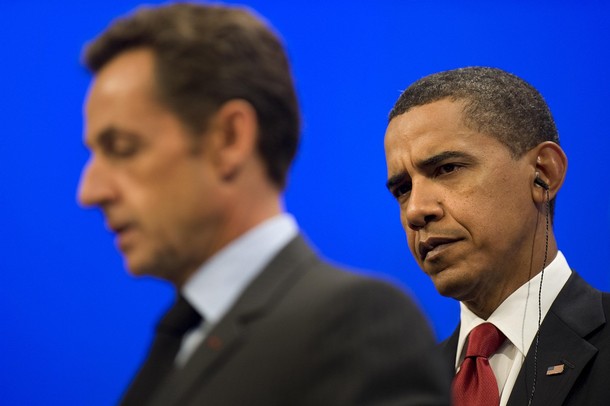
From Roger Cohen, the New York Times: Leading from behind — a phrase first used by a White House adviser in a New Yorker article by Ryan Lizza — was smart policy in Libya. The United States, short on cash, bruised by Iraq and Afghanistan, did not want to head the charge into a third Muslim country, even if the Arab League had backed intervention. Discreet U.S. military assistance with France and Britain doing the trumpeting was sensible.
Discreet does not mean desultory. The United States took out Libya’s air defense system. It provided more than 70 percent of the surveillance, intelligence and reconnaissance capabilities. It flew 70 percent of refueling missions. What it did not do was wade into Libya with the army it had in the vanguard of a motley coalition of the willing.
But of course “leading from behind” was too good a phrase for Republican hopefuls to pass up, whatever the damage done to America under a Republican presidency that lined up behind recklessness. Mitt Romney has latched onto the phrase as if it was his passport to the White House, attacking Obama for “leading from behind” on the Arab Spring and declaring: “God did not create this country to be a nation of followers. America must lead the world, or someone else will.” Michelle Bachmann and Rick Perry have joined the chorus; even yesterday’s candidate, John McCain, could not resist. . . .
If leading from behind brings the success of the Libyan intervention, and refusal to be “a nation of followers” brings you Iraq and Afghanistan, the choice seems clear enough. Lead me from behind, Mr. President. . . .
In these circumstances it’s sensible to husband resources, use the burden-sharing of military alliances to the full, take out terrorists one by one rather than go to war against them, and act in concert with like-minded nations where possible — which is what I take “leading from behind” to mean. It’s a doctrine for a changed world. The Libyan intervention was a conspicuous example of its capacity for good.
None of this means that I accept the inevitability of American decline. On the contrary, I am a strong believer in America’s unique gift for reinvention and regeneration. The American century is over and not coming back — this could be nobody’s century, as befits a globalized world — but that does not make American power any less critical. It just has to be exercised in ways consistent with the facts, as it was in Libya. (photo: Getty)
Image: getty%205%2025%2010%20Obama%20Sarkozy%20g20%20Pittsburgh.jpg
